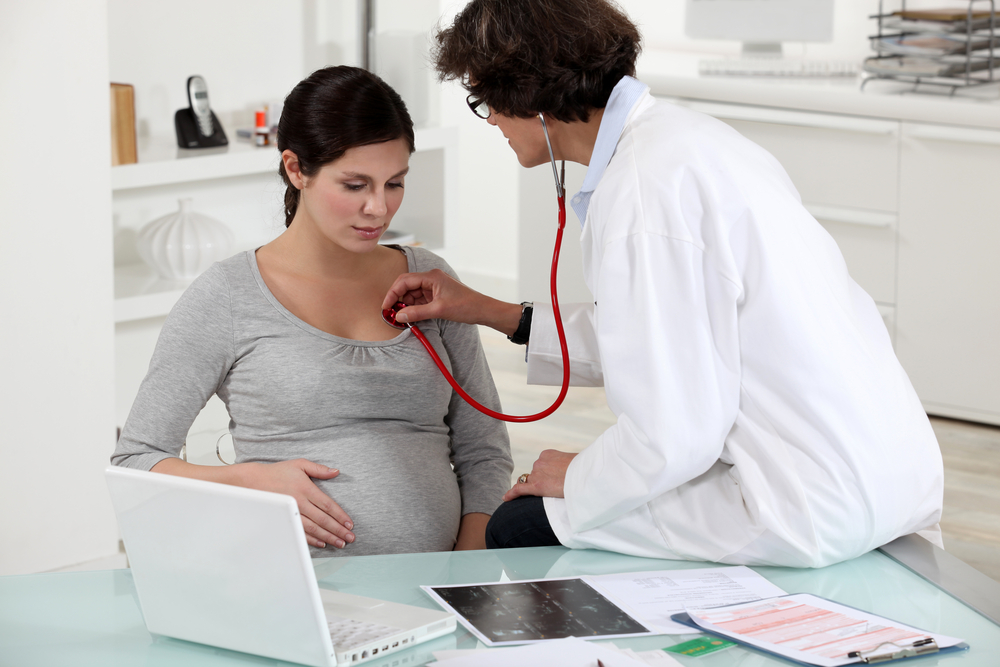About 80% of women during pregnancy experience some severity of morning sickness. Morning sickness is when you feel nauseous and sometimes vomit during pregnancy. Morning sickness thankfully usually subsides after the first trimester and you start to feel much better. About 3% of pregnant women will experience hyperemesis gravidarum, or HG. It can also be known as severe morning sickness. This is extreme, persistent nausea and vomiting while pregnant.
HG does not always subside after the first trimester. In some cases symptoms can get better, in others you may have symptoms until you deliver. Hyperemesis gravidarum can interfere in your daily life, causing you to not do daily tasks because it is very common to vomit multiple times a day. What causes HG is unknown. It is thought to have something to do with the rising hormones of HCG that happens so rapidly during pregnancy, as well as the rise in estrogen.
Risk Factors
If you have HG in a previous pregnancy you are at a higher risk of having it for any other pregnancies. Having multiples, such as twins or triplets can also raise your risk. Another risk is being pregnant for the first time. Having a family history of hyperemesis gravidarum, or a history of morning sickness or migraines also puts you at a higher risk. Having the condition gestation trophoblastic disease can also cause your chances of having HG to be higher.
Symptoms
Symptoms can range from mild to severe. In severe cases you may need to be hospitalized to keep an eye on your symptoms. The most common symptom is severe nausea. Vomiting up to 3 times a day, and the inability to keep any food or liquids down are two other symptoms. HG may also cause you to lose about 5% of your pre-pregnancy weight. Other symptoms include dehydration, feeling dizzy, being lightheaded, urinating less, extreme tiredness, fainting, and headaches. Less common symptoms include low blood pressure, rapid heart rate, dry skin, confusion, jaundice, and Wernicke-Korsakoff syndrome.
Complications
Hyperemesis gravidarum rarely affects your baby. In some cases if you lose too much weight or are too dehydrated your baby may be born with low birth weight. In some cases HG can also cause you to go into premature labor. The main complication caused by HG is weight loss. Your kidneys may stop working, because you are urinating less, causing them to malfunction due to dehydration. You may experience a mineral imbalance, because your body could be low on electrolytes. Your muscles can become weakened or fatigued due to bed rest and low electrolytes. Being dehydrated causes you to make more saliva which in return can increase your nausea or need to vomit.
Diagnosis
Your doctor will be able to diagnose you with hyperemesis gravidarum based on a few things. They will listen to your symptoms, take a history, and perform a physical exam. They may also want to do some blood and urine tests to check for signs of dehydration as well as rule out any other conditions.
Treatment
Treatment will depend on severity. If your symptoms are too severe you may need to be hospitalized to treat the condition. During hospitalization you may need IV fluids if you are severely dehydrated. If you are having trouble being able to eat anything your doctor may try tube feedings. This is when a tube is run down through your nose into your stomach to get your body the nutrition it needs. If you need to bypass your digestive system completely your doctor may suggest total parenteral intravenous nutrition, TPN, which is when your nutrients are given through an IV. Prescription medications can also help ease your nausea. These prescription medications can be in IV, injection, or rectal suppository if you cannot keep anything down orally.
Less severe cases may be able to stay out of the hospital with a few different lifestyle changes. You can try wearing pressure point wristbands to help ease nausea. Eating smaller, more frequent meals can also help. Making sure foods are bland such as crackers, bread, or rice can also be helpful. If you are more nauseous with hot foods, switch to colder foods. Your doctor may want you to drink an electrolyte supplement to help balance your electrolytes. When drinking make sure you take tiny sips through a straw. Make sure you get enough sleep, and try to manage your stress. Ginger can also help ease nausea, you can get ginger tea, lollipops, or supplements. Pyridoxine, also known as vitamin B6, is prescribed for nausea while pregnant. Thiamine, or vitamin B1, can also help ease vomiting.
Purium’s Power Shake is a good source of vitamin B6 and Thiamine!
Prevention
There is no way to prevent yourself from getting hyperemesis gravidarum. You usually don’t know you will suffer from it until you become pregnant. There is no cure, but you can ease symptoms during pregnancy. Once you are no longer pregnant, symptoms usually go away completely. You are at a higher risk of having it again if you were to become pregnant again. Finding ways to help ease your nausea and stop your vomiting can help you be able to function more normally until your symptoms start to ease.
READ MORE: Glucose Tolerance Test
Sources:
https://www.ncbi.nlm.nih.gov/books/NBK532917/#:~:text=Hyperemesis%20gravidarum%20refers%20to%20intractable,nausea%20and%20vomiting%20in%20pregnancy.
https://my.clevelandclinic.org/health/diseases/12232-hyperemesis-gravidarum
https://www.webmd.com/baby/what-is-hyperemesis-gravidarum
https://emedicine.medscape.com/article/254751-overview?form=fpf









